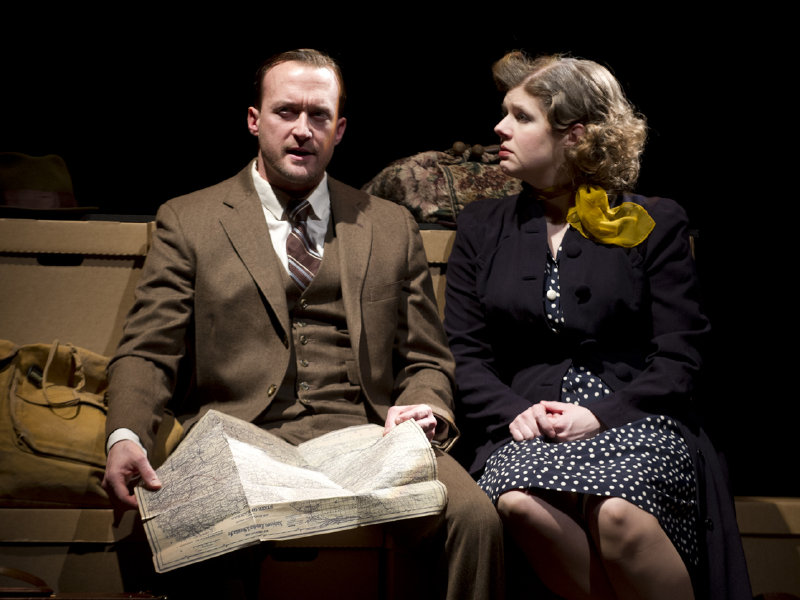The Milwaukee Chamber Theatre has historically not been in the business of presenting world premiere productions of new plays. That makes its current offering, "A Thousand Words," special, but the show's distinctiveness is not solely due to being the newest kid on the theatrical block.
"A Thousand Words" is a smart and entertaining drama that deserves to receive more productions across the country. Even off-Broadway should not be beyond its grasp.
First, some background. Madison writer Gwendolyn Rice read a news story a few years ago about some previously unseen Walker Evans Depression-era black and white photographs being discovered in Key West. They were among items that had belonged to one of the island's most celebrated residents, Ernest Hemingway.
Evans was hired to shoot photos for the federal Farm Security Administration in the 1930s, and many of his works illustrating rural hardship and poverty now hang in major museums.
The story of the found pictures ignited a creative spark in Rice, and "A Thousand Words" is the result. The world premiere production is a joint venture between Madison's Forward Theater Company and the Chamber Theatre. The show was staged in Madison last month and remounted in the Studio Theatre at the Broadway Theatre Center in Milwaukee last weekend.
"A Thousand Words" runs on two parallel tracks. We see Evans and a young female writer sent together to Kansas by the Farm Security Administration to chronicle the agency's work in combating Dust Bowl-driven poverty. It was public relations work for the New Deal.
On the second track, an acerbically aggressive administrator at the Metropolitan Museum of Art in New York wants to get possession of the newly discovered Evans photos that inspired Rice to write this play. He tells one of his minions, a special exhibits director, to get it done, just as she is heading off to Kansas to persuade some rural quilters to agree to a Met exhibition of their work.
Alternating scenes switch back and forth between the '30s and contemporary times, raising the same issue: when is art exploitative?
During the Depression-era scenes, Evans and his project partner, writer Shirley Hughes, spar over that question. He seeks to show the unvarnished rustic images of rural hardship and backwardness. She is sensitive to the pride and privacy of the suffering Plains people.
Jump forward 75 years to the guileless Kansas quilt makers and the revenue hungry Met, eager to slap a reproduction of a piece of art on any gift shop doodad it can sell. Big city hustle meets farmland simplicity, and the issue of artistic exploitation emerges again.
Beyond that, plot threads from the past and present merge in the second act.
Rice's writing is crisp and intelligent, and it possesses a certain theatrical savviness. Her script suffers from one flaw, the blurry suggestion of a connection between Cuban coffee and Evans' Kansas photos. That needs to be clarified.
The production reflects the polished direction of Jennifer Uphoff Gray, and it profits from a couple of superb acting performances. Playing photographer Evans and writer Hughes, Josh Aaron McCabe and Molly Rhode are deliciously tart and sharply funny as they banter and bicker their way through the Midwest. You want them to never leave the stage.
Nate Stuber's set design is dominated by several dozen strategically placed and stacked brown cardboard storage boxes. It presents an oddly interesting picture.
Windfall Theatre's "Wittenberg"
Since its founding 20 years ago, Windfall Theatre has performed in Downtown's Village Church, a most appropriate setting for the production it opened last weekend, the spoofy "Wittenberg." The German city that lends its name to the play's title was of course Martin Luther's launching pad for the Reformation, but it was also where Christopher Marlowe's "Doctor Faustus" sold his soul to the devil and Hamlet went to college.
Playwright David Davalos crafted a 16th century theatrical mash-up of Luther, Faustus and the reluctant Dane, calling it "Wittenberg."
Hamlet makes only cameo appearances. This stage piece is a friendly and sometimes tuneful wrestling match between philosophy professor Faustus and rebel cleric Luther. Faustus is also a nightclub crooner.
The play is simultaneously low and high brow, with its abundant humor mostly falling into the former category, and the intellectual discourse between Luther and Faustus qualifying for the latter. A substantial number of comic and thought-provoking nuggets are to be found here.
David Flores (Faustus) and Robert W.C. Kennedy (Luther) create strong and credible characters for Windfall, but the production needs greater cohesion and a sharper focus to get us through the two dense acts.
Damien has been around so long, he was at Summerfest the night George Carlin was arrested for speaking the seven dirty words you can't say on TV. He was also at the Uptown Theatre the night Bruce Springsteen's first Milwaukee concert was interrupted for three hours by a bomb scare. Damien was reviewing the concert for the Milwaukee Journal. He wrote for the Journal and Journal Sentinel for 37 years, the last 29 as theater critic.
During those years, Damien served two terms on the board of the American Theatre Critics Association, a term on the board of the association's foundation, and he studied the Latinization of American culture in a University of Southern California fellowship program. Damien also hosted his own arts radio program, "Milwaukee Presents with Damien Jaques," on WHAD for eight years.
Travel, books and, not surprisingly, theater top the list of Damien's interests. A news junkie, he is particularly plugged into politics and international affairs, but he also closely follows the Brewers, Packers and Marquette baskeball. Damien lives downtown, within easy walking distance of most of the theaters he attends.







